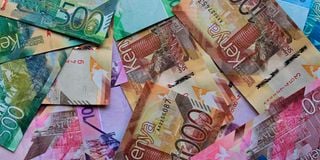How strong shilling aided indebted NSE-listed firms

Kenyan currency notes of different denominations.
What you need to know:
- Five companies booked a combined Sh6.2 billion in unrealised exchange gains from foreign currency loans held.
- Depreciation of the Kenya shilling against world majors such as the dollar sees a firm record an unrealised loss.
Strengthening of the Kenyan shilling in the six months to June lifted earnings for Nairobi Securities Exchange (NSE) listed firms with dollar-denominated loans.
Data shows that five companies with such facilities including TPS Eastern Africa, Car and General, Kenya Airways, Umeme, and Sameer Africa booked a combined Sh6.2 billion in unrealised exchange gains from foreign currency loans held, contrasting to losses of Sh15.9 billion from a weaker local unit at the same time last year.
Indebted firms customarily declare forex gains or losses based on changes in the exchange rate at the reporting stage.
In this arrangement, a firm re-values its foreign currency liabilities at the current exchange rate in a record acknowledging gains or losses that would result if the outstanding loan balances were to be settled at the prevailing rate.
Stronger shilling
The forex movements are then posted on the income statement impacting a company’s profitability.
Depreciation of the Kenya shilling against world majors such as the dollar sees a firm record an unrealised loss from its outstanding foreign currency loans while the opposite sees posting of a gain.
National carrier Kenya Airways (KQ), whose shares remain listed on the NSE despite a trading freeze, marked the most significant gain from a stronger shilling in the period that ended June 30 as it booked a Sh5.39 billion gain to reverse a loss of Sh15.3 billion from a weaker local unit last year.
The unrealised forex gain anchored the struggling airline to a half-year profit of Sh513 million, a first in 11 years since 2013.
“Total operating costs rose by 22 per cent, aligning with the expansion of our operations as we continue to recover from the effects of Covid-19. Direct operating costs were up 36 per cent; fleet ownership costs increased by 11 per cent whereas overheads decreased by 22 per cent partly due to strengthening of the Kenya shilling against major world currencies,” Kenya Airways said last Monday.
Foreign currency loans
TPS Eastern Africa, the operator of the Serena branded hotels saw the second-highest unrealised exchange gain on its foreign currency loans at Sh452.8 million after booking a loss of Sh361.8 million from a weaker shilling last year.
The firm disclosed borrowings of Sh438.1 million under its current liabilities in the period compared to higher arrears of Sh780.5 million previously.
Sameer Africa on its part disclosed gains of Sh56.7 million from the foreign exchange revaluations compared to a loss of Sh69.2 million previously.
The Kenya shilling turned the corner in early February to rally against the US dollar following the end of speculation over a potential default event.





